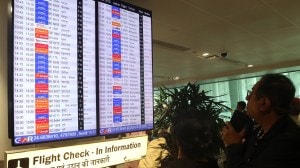With the inauguration of its permanent campus by Prime Minister Narendra Modi on March 12, IIT Dharwad, which started in 2016, is in the process of shifting out of its temporary campus in a phased manner. The institute’s director Venkappayya R Desai speaks to The Indian Express about his priorities with the new institute, changing academic landscapes, interdisciplinary courses, and the suicide cases at the IITs. Excerpts:
Our top priority is to clear the major bottlenecks in the permanent campus. One is the main electrical station, along with the kitchen equipment for the student dining hall.
We also need to get the sewage treatment plant ready, so that we are in a position to move. However, we will move in a gradual manner because we have a lot of sophisticated equipment which cannot straightway be moved from here (current campus) to the permanent campus.
Secondly, we want to ensure that students and faculty are properly housed. Academically, we have seven Bachelor in Technology (BTech) programmes, one BS (Bachelor of Science) and MS (Master of Science) dual degree programme, alongside Masters in Technology (MTech) and Phd programmes.
We want to introduce a BTech programme in the humanities and social sciences department as it does not have one on its own. The other nine departments have the programme in some way or the other. We are also deliberating on introducing economics probability, financial engineering, among other subjects, to make the BS and MS integrated programmes more inclusive.
Additionally, we are also looking to link modern science and technology with traditional technology. We want to use historical materials from Sanskrit literature and classical Indian languages and apply it to modern science, for all branches. Even the new education policy emphasises on promoting Indian languages.
Q. IIT Dharwad is among the youngest IITs in the country. Six months have passed since your appointment as the institute’s director. What milestones, in your opinion, has it achieved? What needs to be worked on?
Story continues below this ad
Recently, IIT Dharwad got formally announced as the Quality Improvement Programme (QIP) centre, giving scope for government, government-aided and private engineering college faculty members to enroll and improve their quality through enhancement of qualifications.
The engineering college faculty members with bachelor qualifications can enroll and get a masters degree through QIP. In addition to the regular salary these faculty members get from their host institutions, they will also get subsistence allowance as these are time-bound programmes.
 IIT Dharwad’s new campus. (Express photo by Sanath Prasad)
IIT Dharwad’s new campus. (Express photo by Sanath Prasad)
Meanwhile, we have only one MTech programme in mechanical engineering. We need to extend this to two more departments — electrical engineering and computer science. Our priority is to serve our full capacity of 25 masters seats under QIP. Since it is a new IIT, the number of professors are less in number. We have 70 professors (including assistant professors) and around 15 visiting professors. However, the sanctioned faculty strength is 100 with a student teacher ratio of 1:10.
Q. IIT Dharwad was mentored by IIT Bombay for its three batches so far. Each IIT has a unique academic culture and strengths. What do you think you have imbibed from them?
Story continues below this ad
IIT Bombay is the second-oldest IIT and is located in the financial capital of the country. As a result, every faculty member’s time is very precious. Things are simple and straightforward in IIT Bombay. The institute also helps us in senate meetings because we have very few full-time professors. During senate meetings, we need help from external senate members from IIT Bombay and industry experts too. We also take help from IIT Bombay professors from relevant departments in shortlisting our faculty applicants.
Q. There have been many suicides in IITs in the last six months. Do you think IITs need to revisit their support systems and improve them to help prevent such deaths?
Caste discrimination is a very general problem. We should make students aware of other children who are more economically and socially challenged. When we make them aware of the existing reality, the students will realise that they can still put up a smiling face and be positive compared to those children who are both economically and socially weaker. Moreover, faculty should also play a major role in enhancing student welfare activities.
When Prime Minister Narendra Modi inaugurated our new permanent campus, he suggested that we use Japanese technology to increase vegetation density around the campus. The vegetation will be planted in lines of vruksha nakshatra that will imbibe Indian traditional values and serve as a stress buster to students. If you look at the life of the student two weeks prior to the suicide, you will find them isolating from the near and dear ones. As a result, they come across negative incidents, news reports and end up in suicidal thoughts. It is equally important to have good food. Being more social will also help students. Unfortunately, some marginalised students are isolated in the initial few weeks in the dining hall sometimes – this happens across all IITs.
Story continues below this ad
Sometimes, ragging also is a major problem. Fortunately, at IIT Dharwad we have not come across such cases.
Q. A research paper published by IIT Bombay recently found that except for Computer Science & Engineering (CSE), and to some extent for Electrical Engineering (EE), IIT Bombay students have predominantly opted for non-engineering jobs. What do you think is the reason?
Things are no longer in silos. I am a civil engineer by qualification, but I have my own interest in linguistic subjects. These kind of things happen with everyone and there is nothing wrong with that. We can’t force students to take up jobs as per their qualifications. I believe in the principle of “get what you like and like what you get”. Life is all about making feasible compromises. In addition to their programmes, students should explore various opportunities in areas of one’s interest. Sometimes, their interests are partially misguided by parents also.
Q. There have been consultations within the government to bring institutes of national importance within the ambit of the proposed Higher Education Commission of India. Would it be a good idea to bring IITs and IIMs within the HECI’s ambit?
Story continues below this ad
It is a good idea. IITs, NITs are excluded from the purview of AICTE. A newly established institution like IIT Dharwad will be deprived of the positive experience of some of the selected institutes which have a history of over 50 or 75 years. There should be good exchange of ideas and best practices. Hence, it is a welcome move to bring institutes of national importance under a regulatory purview.
Q. Interdisciplinarity is among the main focus of the new education policy. How is IIT Dharwad approaching this?
We have a 5 year BS-MS interdisciplinary programme. Students can either choose physics/ chemistry or mathematics/biology specialisations. There are enough electives offered by other departments like humanities and social sciences, philosophy, sociology and others.
Q. Are you worried about ChatGPT and its impact on academics?
Story continues below this ad
I am hearing that ChatGPT will soon make Google extinct, but I think any new innovation cannot be exclusive. We need not get worried excessively because every technology evolves with time. It cannot be 100 per cent accurate and efficient. Any new thing is high on technology but low in experience. Any old thing may be low on technology. However, it is definitely tested by time.
Q. Education faced a huge disruption during the pandemic. It has been over a year since students have joined physical classes. Have you noticed any changes in the learning patterns?
Students are still in the pandemic or lockdown mode. Our faculty members noticed that some students are not at all seen in the campus. They have registered and are nowhere to be seen. It is high time that we as faculty bring the students back to the pre-pandemic levels. It is fine if they are taking up internships, but they should take an official permission so that it is formalised. The learning ability has taken a beating. Lab courses and experiments go on through video demonstrations. The hands-on experience in lab experiments has actually stopped after the pandemic. It is an individual and collective responsibility of every faculty member to restore the learning experience.



 IIT Dharwad’s new campus. (Express photo by Sanath Prasad)
IIT Dharwad’s new campus. (Express photo by Sanath Prasad)





























